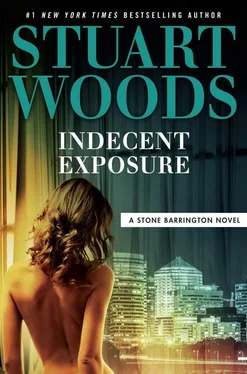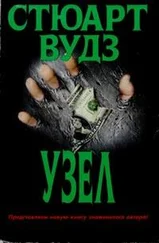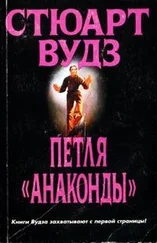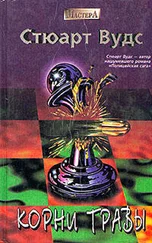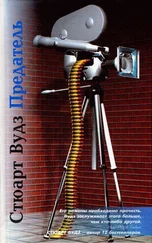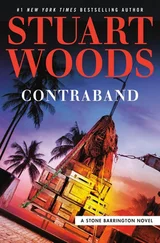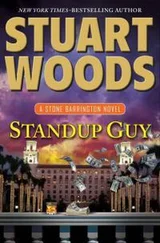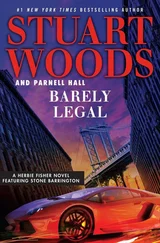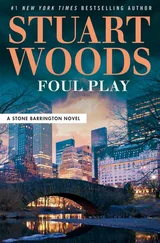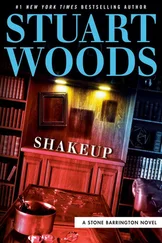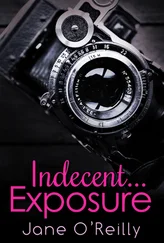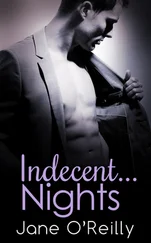“Just like O.J.,” Hazel mused. “Okay, do a first draft, and we’ll go over it together word by word.”
“You’ll have it tomorrow morning,” Parsons said. She went back to her office, fired up her computer, and wrote with abandon, spinning out her story, innuendo by innuendo, and finishing with one short paragraph: “Is Arrington Calder Barrington’s murderer still on the loose? And if so, who might he be?”
She printed the story and sprinted down the hallway to her editor’s office.
Hazel looked up at her. “Already?”
“You said you wanted to see a first draft. Here it is.” She slapped the pages on the desk.
The editor read through the manuscript slowly, making an occasional mark with a grease pencil.
“Well?”
“Here,” Hazel said, “address the places I’ve marked, being sure that any insinuations we make are justified.”
Parsons looked over the story quickly. “That’s it? That’s all that worries you?”
“That’s it.”
“Tell you what, we’ll license the Architectural Digest photos and splash them all over the story, including the murder spot.”
“That’s a brilliant idea, Gloria, it will give our readers just the verisimilitude they need to draw just the conclusion we want them to. Also, see if you can get crime-scene photos from the Virginia cops, and talk to the investigating officer, too.” She picked up the phone. “I’ll get the lawyers in here right away. You clean up the manuscript and we’ll feed it to them, page by page, and get an opinion.”
“I’m on it!” Parsons cried, and ran back to her office. “Hazel,” she said under her breath to herself, “before a year has passed, I’ll have winnowed you out of your job, and I’ll use this story to do it!”
Sitting in the coffee shop, Bob Cantor used his iPhone to do searches on Gloria Parsons and Alphonse Teppi. He found no criminal charges or arrests, but Teppi had been questioned many times by the police. There had been two libel suits filed against Parsons and her magazine, Just Folks , but both had been settled out of court. He paid his bill and went back to his van, but he didn’t think to check his automatic recorder. The red light glowed entertainingly behind his head, but he just didn’t notice.
Gloria got the Virginia sheriff on the line; she was surprised that he had so readily taken her call. “Sheriff?”
“Sheriff Rudolf Sweat,” he replied.
“Sheriff Sweat, this is Gloria Parsons from Just Folks magazine.”
“Oh, yeah, Gloria, I know your stuff.”
“I’m so pleased to have a reader in Albemarle County.”
“You got lotsa readers down here.”
“Thank you so much. May I call you Rudy?”
“Nobody else does, but you can.”
“Do you mind if I record our conversation, so I won’t misquote you?”
“You go right ahead.”
Gloria switched on the recorder. “Were you the investigating officer on the Arrington Calder Barrington murder?”
“I was one of ’em. Old Sheriff Bates took the lead on everything, until I beat him at the polls last election.”
“Well, congratulations, Rudy.”
“Thank you, Gloria. Like I was saying, I was on the scene the whole time, first officer present, in fact. Sheriff Bates got there half an hour later.”
“And what did you find?”
“Dead woman, shotgun to the back of the head. It was a mess.”
“Did you follow crime-scene procedure after that?” Gloria asked.
“Crime-scene procedure around here at the time was to wait for Sheriff Bates to get there and don’t let nobody touch nothing.”
“Tell me what happened from the beginning.”
“Well, Mr. Barrington called nine-one-one and got transferred to us. I was in a radio car a few miles off, and I took the call. The sheriff was in Charlottesville, and it took him a lot longer.”
“What did you do in the meantime?”
“I taped off the scene and got Barrington and the two kids into the library and started asking questions.”
“Did you like the answers?”
“They seemed right to me, and the three of them had the same story. Wait a minute, there was some difference. The kids had taken their saddles into the tack room, and Barrington heard the gunshot while they were gone, I think.”
“Then what?”
“Then they went up to the house, found the front door open and Mrs. Barrington there, dead.”
“Was there a lot of blood?”
“Blood and brains — it was a shotgun.”
“Did you form an opinion about when the gunshot was heard?”
“Yeah, less than five minutes before Barrington got there.”
“Let me ask you, Rudy, is it possible that the gunshot came earlier than that?”
“How do you mean?”
“Well, Barrington was the only one who heard it. Could he have been wrong?”
“I think I see where you’re going, here, Gloria. You mean he might have just made up hearing it?”
“Is that possible?”
“Well, anything’s possible, I guess.”
“Suppose you had evidence that somebody else heard the gunshot earlier?”
“Wasn’t nobody else in the house when I got there.”
“What happened when Sheriff Bates got there?”
“He started all over — that was his way, he didn’t trust nobody else.”
“Did he get the same answers?”
“Yep.”
“And did he accept them as true?”
“I guess. He did spend some time with Barrington on what he heard and when he heard it.”
“Tell me — this is just hypothetical — while the kids were in the tack room was there time for Barrington to go up to the house, shoot his wife, hide the shotgun, and come back to the stable before the kids came out of the tack room?”
“Well, that’s hard to say. I didn’t write down no timeline, and neither did the sheriff. I guess we just both thought the murderer had come and gone. There might have been time for Barrington to do that, though.”
“How did you settle on Rutherford as the murderer?”
“Barrington suggested him, said he had been bothering his wife for several days, calling her up and the like.”
“Did you consider anyone else?”
“Well, no, we had eliminated Barrington, and there wasn’t another person who had had contact with her in the days before. Also, Rutherford ran. He was out of his house and gone by the time we got there. Why else would he have ran if he wasn’t guilty?”
“How did Stone Barrington act while you were there?”
“He was stunned, sort of, and then he was quiet and calm — I think he wanted to keep the kids quiet and calm, too.”
“He wanted to keep them quiet?”
“Yeah. He talked to them a little bit and then left them in the library while he came out and talked to the sheriff and me.”
“What was his reaction to the dead body in the hall?”
“I’d say, kind of clinical, professional. I heard later he used to be a police officer in New York. I guess it wasn’t his first shotgun to the head. Come to think of it, he did better than I did.”
“How long were you and the sheriff at the crime scene?”
“Must have been a couple of hours. We had to wait for some people to come from the hospital and look at the body and do what they had to do.”
“Were blood samples taken?”
“I expect so, but since we never needed them for a trial, they didn’t seem so important. By the time we left, the body was gone, and the servants were cleaning up the mess.”
“Who asked the servants to do that?”
“Mr. Barrington did. I couldn’t blame him, and the sheriff told him to go ahead.”
“Rudy, a personal question — did you ever, at any time, consider that Barrington might have been the killer, instead of Rutherford?”
Читать дальше
